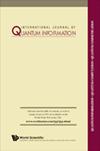利用Ising交互研究潜在博弈
IF 0.7
4区 物理与天体物理
Q3 COMPUTER SCIENCE, THEORY & METHODS
引用次数: 0
摘要
在博弈论中,只要考虑到可数的参与者,问题就能得到妥善处理,而在现实生活中,我们有大量的参与者。因此,一般地分析热力学极限下的博弈。在特定的均衡条件下(通常是纳什均衡),经典博弈和模型哈密顿函数之间存在一对一的对应关系。这种对应关系适用于对称博弈,即使用伊辛哈密顿量的囚徒困境。在这项工作中,我们已经证明了另一类被称为潜在博弈的博弈可以用伊辛哈密顿量来分析。对这项工作的分析带来了对现实世界场景的非常密切的观察。换句话说,使用伊辛哈密顿模型研究的潜在博弈模型精确地预测了大量人口的行为方面。本文章由计算机程序翻译,如有差异,请以英文原文为准。
Study of potential games using Ising interaction
Problems can be handled properly in game theory as long as a countable number of players are considered, whereas, in real life, we have a large number of players. Hence, games at the thermodynamic limit are analyzed in general. There is a one-to-one correspondence between classical games and the modeled Hamiltonian at a particular equilibrium condition, usually the Nash equilibrium. Such a correspondence is arrived for symmetric games, namely the Prisoner’s Dilemma using the Ising Hamiltonian. In this work, we have shown that another class of games known as potential games can be analyzed with the Ising Hamiltonian. Analysis of this work brings out very close observation with real-world scenarios. In other words, the model of a potential game studied using Ising Hamiltonian predicts behavioral aspects of a large population precisely.
求助全文
通过发布文献求助,成功后即可免费获取论文全文。
去求助
来源期刊

International Journal of Quantum Information
物理-计算机:理论方法
CiteScore
2.20
自引率
8.30%
发文量
36
审稿时长
10 months
期刊介绍:
The International Journal of Quantum Information (IJQI) provides a forum for the interdisciplinary field of Quantum Information Science. In particular, we welcome contributions in these areas of experimental and theoretical research:
Quantum Cryptography
Quantum Computation
Quantum Communication
Fundamentals of Quantum Mechanics
Authors are welcome to submit quality research and review papers as well as short correspondences in both theoretical and experimental areas. Submitted articles will be refereed prior to acceptance for publication in the Journal.
 求助内容:
求助内容: 应助结果提醒方式:
应助结果提醒方式:


